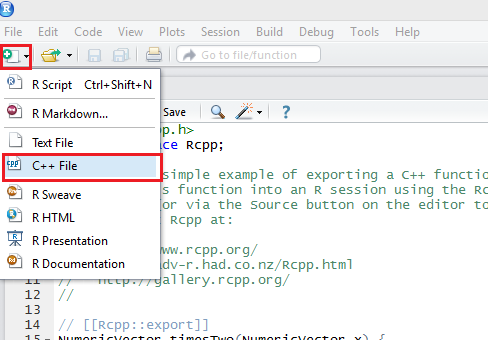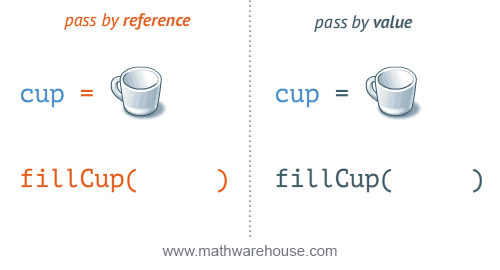Advanced R for Econometricians
Speeding Things Up with Rcpp
Martin C. Arnold, Jens Klenke
Rcpp — FAQs
What is Rcpp?
The Rcpp package allows to implement and easily invoke C++ functions in R by providing a clean and approachable API.
Who should use it?
Anyone who is interested in eliminating bottlenecks which cannot be sped-up in vanilla R.
Is Rcpp a self-contained language?
No. To write code using Rcpp basically means to write C++ code using special C++ classes that allow interfacing with R.
The official quick reference has some code snippets which facilitate the start.
Rcpp — FAQs
Do I need to be fluent in C++?
No.
Rcppis easy to use, even without deep knowledge ofC++. A basic knowledge ofC++syntax and data types is sufficient for a start.The package allows to write C++ code in a style similar to R — syntactic sugar:
Rcppcomes with well tested functions which look and behave very similar to their R equivalent. Sugar versions of arithmetic and logical operators, vector views and many base R functions facilitate the first steps in programming withRcpptremendously.In what follows we will not spend much time on advanced stuff like OO-
C++programming or templates but focus on writing small, self-contained functions.learnCpp is a good source for details on these subjects.
Rcpp — FAQs
When is rewriting code using C++ an attractive alternative?
Typical bottlenecks in R that be addressed using C++ are:
Loops that can’t be easily vectorised because subsequent iterations depend on previous ones.
(e.g., algorithms for Markov chain Monte Carlo in Bayesian models)
- Recursive functions/problems which involve calling functions a large number of times. The overhead of calling functions in
C++is much lower than that inR.
Rcpp — FAQs
Where to learn details and where to find good examples?
The
Rcpppackage vignette is a good startThe Rcpp Gallery provides many comprehensive examples and also applications to statistics and econometrics
stackoverflow has answers to numerous questions that arise in the beginning (more than 2800 question tagged [rcpp] answered). The package authors (especially Dirk Eddelbuettel) often contribute to the discussion.
Technical details are well explained in Seamless R and C++ integration with Rcpp (Eddelbuettel, 2013)
(PDF freely available on Springer Link via UDE intranet)
Rcpp — Prerequisites
We need Rcpp from CRAN as well as a working C++ compiler. Installation is OS-dependent for the latter.
## # get the Rcpp package from CRAN## install.packages("Rcpp")library(Rcpp)Installing a C++ compiler
Windows: install rtools
Mac: install Xcode
Linux: install
gcc/g++via sudo apt-get install r-base-dev or similar.
Rcpp — Prerequisites
Some vocabulary
A pointer contains the physical address of an data in the memory
At the
Clevel,Robjects are stored in the SEXP (S expression) data type. An SEXP is essentially a pointer.
So how does it work?
We use
C++functions which generate and modify SEXP objects faster thanRis able to.Rcppallows a seamless transfer betweenC++and an SEXP objects with low cost by passing pointers (pass by reference) toC++functions using special classes which enclose SEXPs (we will introduce these in a bit).
Rcpp — C++ Syntax Basics
Example: Syntax in C++ — 1
int one() { return 1;}Note that:
We do not use assignment to create functions in
C++!We need to declare the type returned by the function (and also for its arguments)
Scalars and vectors are different objects! There are also differences w.r.t. scalar types:
numeric,integer,characterandlogical(R)double, int, string, bool (
C++)The return statement must be used to return a value!
Every statement must be followed by a ;
Rcpp — C++ Syntax Basics
Example: Syntax in C++ — 2
# R functionisOdd_r <- function(num = 10L) { result <- (num %% 2L == 1L) return(result)}isOdd_r(42L)## [1] FALSE# C++ equivalent # (not yet executable!)bool isOdd_cpp(int num = 10) { bool result = (num % 2 == 1); return result;}Assignment is done using the = operator
Binary arithmetic and logical operators work as in
R. More on this later.Default values for arguments may be specified.
Important: Default arguments are assigned from right to left. Using a default value requires all subsequent arguments to have default values, too.
Rcpp — Inline Compilation
Example: cppFunction()
Small self-contained functions are easily compiled and linked using cppFunction().
Rcpp::cppFunction('bool isOdd_cpp(int num = 10) { bool result = (num % 2 == 1); return result;}')isOdd_cpp() now works like a regular R function.
isOdd_cpp(42L)## [1] FALSERcpp — Inline Compilation
Example: cppFunction()
What happened?
Our function
isOdd_cpp()is sourced byRcpp.Rcppgenerates a wrapper function inR. It then compiles and links theC++function to the wrapper. The function is now available inRunder itsC++name.
isOdd_cpp## function (num = 10L) ## .Call(<pointer: 0x107b5c300>, num)We see that isOdd_cpp() uses .call() to invoke the C++ version of the function which is stored in the specified pointer.
Rcpp — Sourcing a .cpp-file via RStudio

Rcpp — Sourcing a .cpp-File via RStudio
You will be prompted with the following file:
#include <Rcpp.h>using namespace Rcpp;// This is a simple example of exporting a C++ function to R. You can// source this function into an R session using the Rcpp::sourceCpp // function (or via the Source button on the editor toolbar). // [[Rcpp::export]]NumericVector timesTwo(NumericVector x) { return x * 2;}// You can include R code blocks in C++ files processed with sourceCpp// (useful for testing and development). The R code will be automatically // run after the compilation.//// /*** R// timesTwo(42)// */Rcpp — Loops
Example: Summation
sum_R <- function(x) { total <- 0 for (i in seq_along(x)) { total <- total + x[i] } total}double sum_C(NumericVector x) { int n = x.size(); double total = 0; for(int i = 0; i < n; ++i) { total += x[i]; } return total;}Indices start at 0!
C++ methods are called with a full stop, e.g.
.size()Syntax in
for():for(initialize; check; increment)In-place modification:
total += x[i]is equivalent tototal = total[i-1] + x[i]
Rcpp — Loops
Example: Summation — ctd.
x <- runif(1e3)bench::mark( sum(x), sum_C(x), sum_R(x))## # A tibble: 3 × 6## expression min median `itr/sec` mem_alloc `gc/sec`## <bch:expr> <bch:tm> <bch:tm> <dbl> <bch:byt> <dbl>## 1 sum(x) 1.56µs 1.64µs 582125. 0B 0## 2 sum_C(x) 1.56µs 1.76µs 460865. 2.49KB 0## 3 sum_R(x) 14.47µs 15.05µs 65413. 19.74KB 0sum_C() is competitive with the highly optimised primitive sum(). sum_R() is considerably slower.
Rcpp — Vectors and Matrices
Return type of functions
Rcppautomatically wrapsC++base types (likedouble,int,string,bool) using classes which can be handled byRThis is different for more complex structures like vector and matrix.
Rcppprovides special classes for each base type which have to be stated explicitly:- NumericVector, IntegerVector, CharacterVector and LogicalVector
- NumericMatrix, IntegerMatrix, CharacterMatrix and LogicalMatrix
Using classes from the C++ Standard Template Library (STL) will not pose a problem, but requires a deep copy (pass-by-value) whereas using the appropriate
Rcppclass results in a modification of the object (pass-by-reference)
Rcpp — Vectors and Matrices
Example: STL-type mapping
The following code is 'pure' C++ and can be handled by R: Rcpp maps std::vector<type> to NumericVector.
(Note that we use :: to access objects from the std namespace)
std::vector<int> zeros_STL(int N) { std::vector<int> X(N); return X;}The above requires a copy of X which is avoided if we use IntegerVector or NumericVector instead.
NumericVector zeros_Rcpp(int N) { NumericVector X(N); return X;}Rcpp — Vectors and Matrices
Example: STL-type mapping — ctd.
We compare both functions after sourcing using cppFunction().
x <- 1e6Lbench::mark( zeros_Rcpp(x), zeros_STL(x))## ## # A tibble: 2 x 13## expression min median `itr/sec` mem_alloc `gc/sec` ## <bch:expr> <bch:tm> <bch:tm> <dbl> <bch:byt> <dbl> ## 1 zeros_Rcpp(x) 729.5µs 1.02ms 307. 7.63MB 5.44## 2 zeros_STL(x) 1.85ms 3.31ms 225. 3.82MB 2.64Rcpp — Vectors and Matrices
Sometimes it will be convenient to generate objects using the STL and use wrap() before returning them.
Example: wrap()
// using STL constructor functionNumericVector iota(int N) { std::vector<int> X(N, 1); return wrap(X);}// using Rcpp constructorNumericVector iota(int N) { NumericVector X(N); std::fill(X.begin(), X.end(), 1) return X;}Rcpp — Vectors and Matrices
C++ implementations that heavily rely on loops can often compete with R primitives in terms of speed.
Example: rowSumsC()
NumericVector rowSumsC(NumericMatrix x) { int nrow = x.nrow(), ncol = x.ncol(); NumericVector out(nrow); for (int i = 0; i < nrow; i++) { double total = 0; for (int j = 0; j < ncol; j++) { total += x(i, j); } out[i] = total; } return out;}Note the short-hand definition of variables of the same type.
We subset matrices with () instead of [].
Rcpp — Data frames and Lists
Rcpp has classes List and DataFrame which are most interesting for input to and output of functions.
Example: extracting data from lm object
The function below extracts the residuals from a linear model of class lm.
NumericVector residuals(List mod) { NumericVector resids = as<NumericVector>(mod["residuals"]); return resids;}Remember that in R, a
data.frameis an object of typelistso the above function would also work on adata.framewith named columnresiduals.Note that manual conversion to
NumericVectorusingas()is not necessary here becauseresidualsare always of the same type.
Rcpp — Data frames and Lists
Example: extract data from lm object — ctd.
We may return selected entries of an lm object in a list
(note that the Rcpp class is List with a capital L)
List components(List mod) { NumericVector resids = as<NumericVector>(mod["residuals"]); NumericVector coefs = as<NumericVector>(mod["coefficients"]); NumericVector fitted = as<NumericVector>(mod["fitted.values"]); List out = List::create( Named("Residuals") = resids, Named("Coefficients") = coefs, Named("Fitted Values") = fitted ); return out;}Rcpp — Two Paradigms

Rcpp — Two Paradigms
Digression: pass by reference vs. pass by value in C++
In C++ a pass by value happens by default.
(The functions below have return type void, i.e., they do not return anything.)
void test(int A) { // A is passed by value int B = A; // B is a copy of A A = 2 * A; // A is altered inside the function}Pass by reference is invoked using the address-of operator &.
void test(int& A) { // A is passed by reference, no copy is created int B = A; // B is a copy of A A = 2 * A; // A is altered inside AND outside the function}Rcpp — Two Paradigms
Digression: pass by reference vs. pass by value in C++
We may protect inputs from being altered inside and outside the function.
void test(const int A) { // A is passed by value int B = 2 * A; // and cannot be altered}void test(const int& A) { // A is passed by reference int B = 2 * A; // and cannot be altered}Note that it is admissible to use the address-of operator & in variable assignment.
int& B = A; // B is a reference to ARcpp — Two Paradigms
Digression: pass by reference vs. pass by value in Rcpp
The behavior is somewhat different in Rcpp.
#include<Rcpp.h>// [[Rcpp::export]]void test_reference(NumericVector A) { NumericVector B = A; Rcout << "Before: " << std::endl << "A: " << A << std::endl << "B: " << B << std::endl; A[1] = 0.5; Rcout << "After: " << std::endl << "A: " << A << std::endl << "B: " << B << std::endl; }Rcpp — Two Paradigms
Digression: pass by reference vs. pass by value in Rcpp
Rcpp does not copy an object when passed as an argument to a function or on assignment!
x <- 1:3/10test_reference(x)## Before: ## A: 0.1 0.2 0.3## B: 0.1 0.2 0.3## After: ## A: 0.1 0.5 0.3## B: 0.1 0.5 0.3test_reference() alters the values of A and B as expected. But what happened to x?
Rcpp — Two Paradigms
Digression: pass by reference vs. pass by value in Rcpp
We find that x was modified outside the function.
print(x) # check that x was modified## [1] 0.1 0.5 0.3What happened?
The value passed to
Aintest_reference()is essentially the address pointing toxin the memory. The function works onxby reference.Also the line
NumericVector B = A;does not create a copy ofAbut an object pointing to data at the same memory location. Altering the value ofAthus alters the value ofB, too!
Rcpp — Two Paradigms
Digression: pass by reference vs. pass by value in Rcpp
Using clone() we may bypass the reference on assignment and work with the copy B.
#include<Rcpp.h>// [[Rcpp::export]]void test_clone(NumericVector A) { NumericVector B = clone(A); Rcout << "Before: " << std::endl << "A: " << A << std::endl << "B: " << B << std::endl; B[1] = 0.5; Rcout << "After: " << std::endl << "A: " << A << std::endl << "B: " << B << std::endl; }Rcpp — Two Paradigms
Digression: pass by reference vs. pass by value in Rcpp
x <- 1:3/10test_clone(x)## Before: ## A: 0.1 0.2 0.3## B: 0.1 0.2 0.3## After: ## A: 0.1 0.2 0.3## B: 0.1 0.5 0.3print(x) # check that x was not modified## [1] 0.1 0.2 0.3Rcpp — Exercises Part 1
Find out why the following code gives a compile error:
#include<Rcpp.h>// [[Rcpp::plugins("cpp11")]]NumericVector x{1, 2, 3, 4, 5};IntegerVector id{1};double y = x[id]; // produces compile errorRcpp — Exercises Part 1
Benchmark the functions below against each other for x<-rnorm(1e2), x<-rnorm(1e4) and x<-rnorm(1e6). Comment on the results.
NumericVector test_clone_return(NumericVector A) { NumericVector B = clone(A); B[1] = 0.5; return B;}NumericVector test_reference_return(NumericVector A) { A[1] = 0.5; return A;}Rcpp — Syntactic Sugar
Another benefit of using Rcpp classes is Rcpp sugar — more efficient high-level syntax similar that is similar to R. We give simple examples for the most important features.
See the (unofficial) list of sugar functions for more examples.
Binary arithmetic, logical and unary operators
NumericVector x, y;//arithmeticNumericVector res = x / y;NumericVector res = 2.0 - x;NumericVector res = x / ( y * y );//comparisonLogicalVector res = x <= y;LogicalVector res = x < 2;LogicalVector res = ( x + y ) < ( x*x );//negationNumericVector res = -x;LogicalVector res = ! ( y < z );Rcpp — Syntactic Sugar
Logical summary functions
// at least one elementis_true( any(x <= y) );is_false( any(x <= y) );// all elementsis_true( all(x <= y) );is_false( all(x <= y) );// all the above return boolbool res = is_false( all(x <= y) );There is no recycling: vectors need to have equal lengths, otherwise the compiler will return an error.
Note that the conversion to bool using is_true() or is_false() is mandatory. Omission will result in a compiler error.
Rcpp — Syntactic Sugar
Vector views
Rcpp provides functions which give vector 'views' more efficiently than their R equivalents since they use pointers instead of copies.
head(x)tail(x)rep_each(x, 10)rep_len(x, 3)rev(x)seq_along(x)seq_len(10)Rcpp — Syntactic Sugar
Mathematics and statistics
Most math operations, scalar and vector summaries, and search algorithms have performant sugar equivalents.
// some examples of mathematical sugar implementationsabs(), ceil(), ceiling(), choose(), exp(), factorial(), floor(), log(), sin(), sinh(), sqrt()// some examples of scalar and vector summary functionsmean(), min(), max(), sum(), sd(), var(), cumsum(), diff(), pmin(), pmax()// finding valuesmatch(), self_match(), which_max(), which_min()Very convenient: the d/p/q/r functions for standard distributions are implemented, too.
NumericVector x = rnorm(100);Rcpp — Standard Template Library (STL)
The C++ STL is an extensive collection of generic data structures, algorithms and iterators. We will discuss simple examples of some components.
The cplusplus reference provides a comprehensive summary of the available libraries.
The following collections are recommended for beginners to start with:
numeric — operations on sequences of numeric values
algorithm — functions which work on ranges of elements using iterators
The following examples show .cpp-files as some require a different header than included by default
Rcpp — STL Iterators
Iterator objects come with operators that allow to iterate over a range elements in in a more abstract way than a classic for() loop does with an indexing variable.
Example: NumericVector::iterator
#include <Rcpp.h>using namespace Rcpp;// [[Rcpp::export]]double sum_it(NumericVector x) { double total = 0; NumericVector::iterator it; for(it = x.begin(); it != x.end(); it++) { total += *it; } return total;}Each Rcpp vector type has a separate iterator
Note that we use the dereference operator
*itto get the value of the current element
Rcpp — STL Iterators
There are functions which accept iterators as arguments.
Example: apply()-style functions
#include <numeric>#include <Rcpp.h>using namespace Rcpp;// [[Rcpp::export]]double sum_accu(NumericVector x) { return std::accumulate(x.begin(), x.end(), 0.0);}accumulate()is in the numeric STL so we have to include it in the headerSetting the starting value
0.0ensures that adoubleis returned (use0for aninteger)
Rcpp — STL Algorithms
A very useful STL algorithm is transform() which applies an operation sequentially to elements in (up to two) ranges and stores the result in another range.
Example: std::transform()
We may use transform() to square all elements of a vector.
#include <Rcpp.h>using namespace Rcpp;double f(double x) { return std::pow(x, 2); }// [[Rcpp::export]]std::vector<double> square(std::vector<double> x) { std::transform(x.begin(), x.end(), x.begin(), f);return x;}Note that we do not need to export f() because it is only a subroutine of square()
Rcpp — STL Algorithms
Example: (partial) sort
The following Rcpp function returns a copy of the input vector with the first n elements sorted.
// [[Rcpp::export]]NumericVector nth_partial_sort(NumericVector x, int nth) { NumericVector y = clone(x); std::nth_element(y.begin(), y.begin()+nth, y.end()); std::sort(y.begin(), y.begin()+nth); return y;}Rcpp — STL Algorithms
Example: (partial) sort
Let's benchmark nth_partial_sort() against R's sort() for a full sort.
x <- rnorm(100)bench::mark( nth_partial_sort(x, 100), sort(x), relative = T)## # A tibble: 2 × 6## expression min median `itr/sec` mem_alloc `gc/sec`## <bch:expr> <dbl> <dbl> <dbl> <dbl> <dbl>## 1 nth_partial_sort(x, 100) 1 1 10.5 2.62 10.5## 2 sort(x) 12.9 11.8 1 1 1Rcpp — Programming Strategy
Write most of your code in
Rto take advantage of its high abstraction levelProfile your code, identify bottlenecks and replace those sections (by writing entire functions) with
C++for performance improvement.Make sure that your
C++routines have the same call signature as their slowRequivalents.
Rcpp — Exercises Part 2
Implement the
Rfunction below usingRcppfor integer input (and output) and benchmark both versions.f <- function(n) {if(n < 3) return(n)return(f(n-1) + f(n-2))}Reconsider the function
nth_partial_sort(). Compare its performance with that ofR'ssort()for large vectors. Explain your findings.Convert
all(),range()andvar()intoC++. You may assume that the inputs have no missing values.
